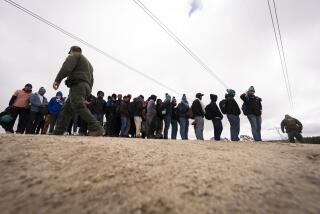Once a refugee, an O.C. woman aids others in the same predicament
Owliya Dima scanned the bare apartment, noting the only new items the family owned: six white pillows stacked on two box springs that were missing their mattresses.
In the living room were three mismatched sofas donated by a church. One of the few items in the kitchen was an old skillet that the refugee family had brought from Iraq. The father, Hussam Zabiba, held up a handful of miniature shampoo and soap bottles for Dima to see. “Hotel,” he explained.
Dima, an Ethiopian Muslim who had been a refugee herself nearly three decades ago, moved through the two-bedroom Anaheim apartment with an Arabic interpreter, compiling a list of needed items. “Iron? And vacuum cleaner?” she said, making a note to herself about what to look for when she scoured garage sales the next weekend.
Years of war and famine in the Middle East and Africa have brought waves of Muslim refugees to the United States. The newcomers have often found themselves in communities that are ill-prepared and, at times, unwilling to help.
And so, much of the task of caring for newcomers has fallen to volunteers like Dima. She is a one-woman resettlement agency.
The memories of her own experience replay in her mind each time she enters a refugee’s apartment. She remembers spending the first four months in America in tears. With her husband at work, she was left at home with their 3-year-old-daughter and felt isolated in a city where she knew no one and spoke only Oromo, from her native Ethiopia, and Somali.
As Dima surveyed the Zabibas’ apartment she saw a handful of plates, two tea cups and no glasses in the kitchen cabinet. On the counter, a chicken was thawing, but there was no knife to cut it. Zabiba and his wife, Layla, followed Dima through the rooms, murmuring, “Thank you.”
When Dima returned a couple of hours later, her minivan was loaded with new and used items, some taken from her own cabinets.
Hussam would not let Dima help bring the items into the house — insisting that he do it himself. As she continued to empty the van, he shook his head, saying, “This is too much, this is too much.”
Dima is a firm believer in naseeb, or fate. “When refugees come, whatever is theirs will come,” she said.
Before she left, a call came from a resettlement agency: another newly arrived Iraqi family needed help.
Sharing resources
Before Dima, now 53, arrived in California in 1984, she had mostly lived a nomadic existence with her father’s family in Kenya and Somalia.
They had fled Ethiopia in the early 1960s after her father, an aunt and her grandfather were killed in political turmoil there. The family went to Kenya, where they moved every month or so to avoid the army and militias. About three years later, they moved to Somalia, where Dima met her husband, Siraj Hussein, another Ethiopian, in a refugee camp.
Hussein was granted refugee status in the U.S. and arrived in San Diego in 1983 with the help of the International Rescue Committee, a nongovernmental relief agency. Less than a year later, Dima and their daughter followed.
At the time, Dima didn’t understand the role of resettlement agencies. “What relation do you guys have?” she asked her husband. “How do we know them, that they are doing this for us?”
The family soon moved to Orange County, then as now a budding center of Muslim life, where Hussein got a job with the county animal control department and Dima became a certified nursing assistant. She worked as an in-home nurse assistant for years before eventually leaving to be a full-time mom to four daughters.
When Somali refugee families, who had been displaced years earlier by civil war and political strife in their country, began arriving in the late 1990s, Dima, by then active with several mosques, was asked to help because she spoke the language. She helped enroll the children in school, got them vaccinated and explained the basics, like coin-operated laundromats.
She gave them things from her own house and took them to Friday prayers at the mosque in Garden Grove, asking for donations as people left.
Since then — as the refugees she helped have grown to include Eritreans, Ethiopians and, increasingly, Iraqis — she has refined the process. She sends out donation requests to an Internet mailing list of about 300, and last summer she formalized her efforts with the launch of a nonprofit, the Tiyya Foundation.
Sahar Ali, a Mission Viejo resident who also helps refugees, met Dima more than a year ago when they were both collecting furniture.
“She doesn’t like to take credit,” Ali said. “She says everybody does that, but really she is the only one who does.”
On many days, Dima crisscrosses the county in her gray van in search of kitchenware, towels, sheets, strollers, sofas. Her phone number is passed around from donor to donor, from refugee to refugee.
She is compact, standing barely 5 feet tall, but with a strength not evident until she lifts a mattress on her own. She dresses in long skirts, flat shoes and a hijab that rims her high cheekbones.
Many Saturday mornings, often before the sun begins to peek out, she is in her van headed to yard sales.
Unmet local needs
The Zabibas arrived in late September 2010 with only five suitcases and the four children’s backpacks, mostly filled with clothes. The Shiite family had received death threats in Iraq because of Hussam Zabiba’s work with American companies.
They were sponsored by a Christian friend who had fled Iraq earlier and was living in Anaheim. Technically sponsors are expected to support the refugees and help them adjust, but as is often the case, the friend didn’t have the time or money to do much.
Resettlement agencies help for three months with cash, food stamps and medical assistance. Much of the money disappears quickly through initial hotel stays, security deposits, rent and transportation.
Ideally, in those three months, refugees become self-sufficient, but religious and ethnic communities commonly help support them after that. When it comes to giving, however, Muslim communities are often more focused on helping people overseas. There are numerous international Muslim charities that have operated for decades, but only recently has one opened for the needy in the U.S.
Last year, the agency, Islamic Circle of North America Relief, which runs women’s and homeless shelters, offers mental health counseling and provides refugee services across the country, opened a small office in Anaheim. That office closed within months because of a lack of funds.
The Muslim community here is made up mostly of non-refugee immigrants and those born in America. There were few refugees until recent years, leaving the community ill-prepared to handle such an influx, said Yassir Fazaga, an imam at the Mission Viejo mosque and a mental health counselor at Access California Services.
“The refugees … are brought here by necessity. Their needs are just a lot, and the mosques are not equipped to handle that,” he said.
Since the U.S. began accepting large numbers of Iraqi refugees in 2007, thousands have settled across the country, more than 18,500 in 2009 alone, according to the Office of Refugee Resettlement.
Once they arrive, many migrate to communities with large Muslim or Arab populations, among them some Orange County cities, where they can hear their own languages, shop in Middle Eastern or African grocery stores and attend a mosque. They expect fellow countrymen to help them learn the basics of American living: how to use an ATM, get a driver’s license and establish good credit.
But they find that many in the community don’t have the time or don’t want the burden.
“He who has been here 10 years is not going to call the refugee,” said Hussam Zabiba. “Because he considers him new and has lots of questions and it will be tiring.”
Dima visited a women’s Koran study class once, hoping to spur interest in reaching out to the new families, even taking one woman to visit a refugee couple who were expecting a baby. A few weeks later, the woman, who lives in Newport Beach, called Dima, offering a crib.
Dima gently suggested she take it to them herself, but the woman said she didn’t have time.
“I’m trying to figure out where are the Muslim people when people need help,” Dima said. “The only response is ‘You guys are doing a good job.’ ”
The previous week, she had made what was supposed to have been a quick stop at a Fullerton house where an Iraqi divorcee and her 17-year-old son rented a room. Dima brought a bag of rice, a bottle of cooking oil, some lentils and tomato sauce.
“Is this all for me? I am rich now,” said the woman.
An hour and a half later, Dima left after listening to her recount her struggles to find a job, her son’s adjustment and having two surgeries in a country where she has no family or friends.
“We have no one here,” the woman said and began to cry. She wondered aloud why, despite the dangers, she had left Iraq.
“Why I want to connect people, it’s not to fill stomachs, it’s to fill the emotional need,” Dima said. “What kills people when they come here isn’t the lack of tangibles, it’s loneliness.”
The volunteer work can be a strain on Dima and her family, though they are supportive.
After Dima left the Zabibas one morning, Dima’s youngest daughter, Zahra, called, asking her to take her fifth-grade science project to school. She had forgotten it at home, and the project had to be handed in before school let out to avoid a failing grade. Dima promised to drop it off.
Somewhere during her visits to the next six families — taking them lamps, bags of clothes and a computer, and sharing cups of tea — she forgot.
Zahra called at 3:15 p.m., crying. Dima quickly drove home. But it was too late.
“I’m going to hear about this tonight,” she said.
More to Read
Sign up for Essential California
The most important California stories and recommendations in your inbox every morning.
You may occasionally receive promotional content from the Los Angeles Times.











